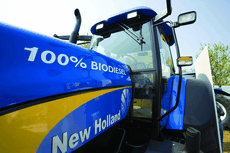Biodiesel power on show

The emphasis at Grassland UK may have been on grass kit, but that didn’t stop energy crops rearing their head.
What drew visitors in particular was a New Holland tractor with a sign saying that unmodified versions of the company’s TM tractors can be run on 100% biodiesel.
To prove the point that biodiesel power is reliable and doesn’t damage the engine, the company has been running a 194hp TM190 on 100% biodiesel round the clock, seven days a week.
It has now completed three weeks of non-stop cultivations and trailer hauling on five farms near Bordeaux, France and racked up a total of 500 hours.
Tests are still being carried out, but it seems that the power drop compared to diesel is likely to be under 5%, says NH.
The only additional maintenance requirement is that fuel filter change intervals drop from 600 hours to 300.
While conventional diesel engines can handle fuel with a high content of biodiesel, common-rail engines can only stomach a much lower percentage, typically 20-30%.
That’s chiefly because their ultra-fast and ultra-precise solenoid-operated injection systems are set up for mineral fuels.

NH isn’t the only tractor manufacturer that sees an important future for biodiesel-powered tractors.
Finnish maker Valtra says 100% biodiesel can be used in its tractors with non common-rail diesel engines without modification.
However the engine oil and fuel filter must be changed twice as often as normal and the company recommends that a separate water filter or prefilter is fitted between the fuel tank and engine.
Biodiesel can also corrode painted surfaces, plastic and rubber, so drivers need to be extra cautious when they fill the fuel tank.
It adds that power output is about 3% less compared to standard diesel fuel.
Emissions of smoke, particulates and carbon monoxide are halved, but nitrogen oxide emissions go up by 3-10%.
Biodiesel doesn’t keep as well as normal diesel and generally shouldn’t be stored for more than a year.
Its freezing point is -13deg C, which means that in very cold conditions it may have to be winterised or mixed with standard diesel.
Like New Holland, Valtra’s common-rail engines can only handle a lower percentage of biodiesel in the fuel.
The company is currently running trials on common-rail engines but says for the time being biodiesel should only be used in these engines as a 5% mix.
Both companies stress that any biodiesel used should meet EN14214 standards and that cold-pressed rape oil that hasn’t been esterified (cracked with methanol and caustic soda) isn’t suitable.
Farmers in Holland and Germany are beginning to run tractors on biodiesel, but in the UK the eco-friendly fuel struggles to compete with relatively low (but rising) red diesel prices.
If you do plan to use biodiesel in a tractor, check with the manufacturer first (especially if it’s still under warranty).

